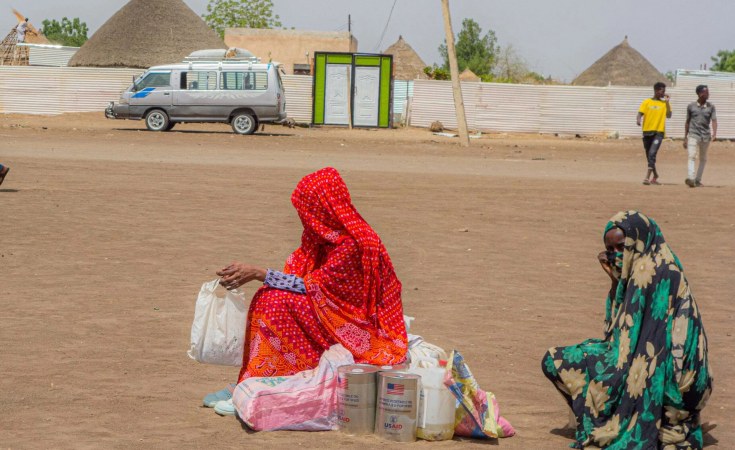Kampala / Nyala — Khadija must leave the confines of the Otash camp for internally displaced people, on the outskirts of Nyala, capital of South Darfur, and travel to the site of her destroyed home in the Khartoum Belil neighbourhood of the city, to collect some of the produce she has grown there.
She says that for more than a month she has depended on what she planted to cover some of her needs, and to achieve some measure food security for her family in light of the prevailing famine in the region.
Khadija Hashim, an employee at the Ministry of Finance, told Radio Dabanga that she was forced to move to the Otash camp after her home was completely destroyed. However, she returned to the site to cultivate some fast-growing crops on the land.
She says that among the ashes of her ruined home, she has begun harvesting okra, in addition to squash, hibiscus, relying on her farm's production for more than a month.
Fast-growing crops
These days, many small-sale farmers in Darfur like Khadija, have begun harvesting fast-growing crops, such as sorghum, peanuts, tomatoes, and watermelons, to help alleviate some of the suffering that families have experienced due to the famine that has struck the region.
The famine has led to the death of many people, and it still threatens the lives of thousands, according to reports from UN organisations and agencies, which indicate that more than 230,000 people are at risk of famine in the region.
The agricultural areas in Darfur region are estimated at about 55 million acres, but the actual cultivated areas this year do not exceed 12 million acres, due to the war.
Positive impact
The start of the harvest of fast-ripening crops has had a positive impact on people' lives, and has led to an improvement in the living conditions of the residents of some areas of the region.
Journalist Fadil Ibrahim, from Shaeria locality in East Darfur, says that the locality's residents have begun to live off the new products of the agricultural season, adding that it has brought about a major improvement in the living conditions.
Ibrahim pointed out to Radio Dabanga that the local residents have been living through difficult days during the past months due to food shortages, high prices, and scarcity of cash. He added that the situation has now entered a phase of relief with the harvest of autumn fruits such as peanuts, watermelons, cucumbers, okra, tomatoes, and corn, so food prices have decreased significantly.
He added that families are now able to provide their daily meals, and that breadwinners no longer have to worry about providing food.
Ibrahim pointed out that some areas have seen new corn production, noting that a farmer celebrated his new production a few days ago, and came to the city market carrying a quantity of millet to announce it to the public.
Crops in the rubble
Caller Mohammed Ahmed Rahmat Allah, from El Radoom locality, says that some agricultural crops have reached the local markets, including watermelons, rural bread, dates and tomatoes. He also pointed out the recovery of fish markets, which have become an alternative to red meat, the prices of which have increased in recent days.
He added that the arrival of new crops to the region's markets contributed to reducing prices and improving the living conditions relatively, despite the high poverty rate in the locality.
Sheikh Musa Abdullah Hussein, from the Markandi area in Kubum locality, says that some people have harvested the bounties of the autumn, especially kerib and rural bread, but he stressed that it is not enough in light of the high prices of food and the lack of cash liquidity.
Autumn harvest
In Nyala, the capital of South Darfur, the markets are also witnessing a large influx of autumn products.
However, caller Othman Yaqoub downplayed the role of these products, pointing out that those who benefit from them are a small proportion of the population.
Khadija said that autumn products such as rural bread (corn) have reached Nyala markets, but she pointed out that the need for food is great and cannot be covered by fast-producing agricultural crops.
She explained that the price of corn has decreased from 10 thousand pounds per millet to 8 thousand pounds, but despite that, there are still families suffering in obtaining food, noting that she knows a family that has previously gone without dinner.
From the far eastern part of North Darfur, citizen Hamad Ajab El Dour from the Umm El Hussein area, describes the living situation as miserable. He adds that citizens are suffering greatly from famine, in addition to the exponential rise in food prices, as the price of a Malwa of corn has reached SDG10,000, and a 25 kilogramme sack of flour has reached SDG80,000.
As reported separately by Radio Dabanga, new figures show that in the largest displacement crisis in the world, more than 10.8 million Sudanese are internally displaced. This represents 20 per cent of the population of Sudan, and 14 per cent or one in seven of displaced people worldwide.
The latest Sudan Mobility Overview, published bi-monthly by the Displacement Tracking Matrix (DTM) of the UN International Organization for Migration (IOM), highlights that Sudan, which represents the largest displacement crisis in the world, now hosts approximately 14 per cent - on in seven - displaced people worldwide. Over 20 per cent of the population in Sudan was displaced since 15 April 2023.


